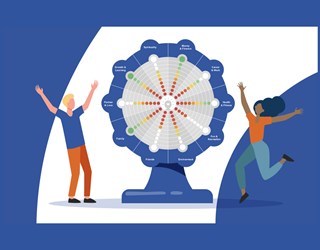Time management: a guide for teachers and education staff
One of the biggest challenges people face is managing their time productively and coping with their workload. Teachers juggle classroom time, exams, lesson prep and marking. Non-teaching staff are faced with admin, finances, staffing, tech support and anything else needed to keep the school running.
Whatever your role, this article offers tips to help you manage your workload and life goals productively.
Guides / 5 mins read

Work out your goals
Spend some time thinking about your goals and priorities — personal, professional and family.
Consider the short, medium and long term. Small goals can act as stepping stones towards bigger ones and give you confidence that change is possible.
Make a list
Get a notepad, diary, calendar or even the Notes app on your phone. User this to keep a daily or weekly list.
Keep track of the tasks that keep being moved or not getting done. Ask yourself why you aren’t able to get to them. Do you need to carve out dedicated time? Or can they be delegated to someone else?
Prioritise the important tasks
Tasks can be grouped into four categories:
- Urgent and important
- Not urgent but important
- Urgent but not important
- Neither urgent nor important
Clear your urgent and important tasks ASAP, then concentrate on "not urgent but important" tasks. By focusing on these tasks ahead of time, you minimise the likelihood of them becoming urgent and important later.
Break tasks down into manageable steps
We can put off tasks when they seem dauntingly large. ‘Prep year 6 history’ can feel like a big undertaking.
But you can try breaking it down into smaller steps.
Tackle them one at a time, and enjoy the feeling of satisfaction when you tick each one off.
Don’t forget it update your list regularly to keep you on top of your tasks.
Recognise and reward your achievements
Reward yourself for achieving tasks by doing something not related to work. This could be anything you enjoy: a yoga class, relaxing with a book or a special meal with friends.
Rewarding yourself for achieving your goals is a good form of self-care and promotes your wellbeing both inside and outside of work.
Rest up ahead of intense periods of work
If you have a particular period of intensity and busyness coming up, such as an OFSTED inspection, be sure to get adequate rest before the intensity hits. That way you’ll head into this busy period with a solid foundations, and you’ll be more likely to approach it calmly and confidently.
Consider a nice treat or reward that you can enjoy once it’s over. Maybe booking some annual leave, going on holiday or taking time for one of your passions.
Value your time
Work out the cost of your time per hour. Are there jobs that keep being put off and moved from list to list because they are time-intensive chores and things you just don't want to do (e.g., gardening, laundry, a deep clean of the house)?
Work out how long it would take you to do those chores and how much that would cost in your time. Compare that with how much it would cost to have someone do the chore for you (e.g., a gardener, a weekly cleaner). If it is more cost and time effective to hire a professional, then it may be worth delegating the task and freeing up your time.

Use a time management technique
The Pomodoro Technique®, created by consultant and time management expert Francesco Cirillo, is effective for boosting productivity for both pupils and education staff.
Pomodoro is Italian for "tomato," and although the technique itself doesn't require tomatoes, the inventor used a tomato-shaped egg timer!
The basics are as follows:
- Pick a task. Choose something you need to get done. Big or small, something you've been putting off for a million years. All that matters is that this task requires your full, undivided attention.
- Set the Pomodoro (your timer) for 25 minutes. Promise yourself that you will spend 25 minutes on this task exclusively, without interruptions. You can do it! It's only 25 minutes.
- Work on this task until the timer rings. If you suddenly realise you have something else you need to do, write the task down on a sheet of paper.
- When the timer rings, put a checkmark on your paper. Congratulations! You've spent an entire, uninterrupted "pomodoro" on a task.
- Now take a short break. Before you begin your next task, do something relaxing for about 10 minutes. Breathe, meditate, grab a cup of coffee, go for a short walk or do something else not work-related. Your brain will thank you later.
- Every four pomodoros, take a longer break. Once you've completed four Pomodoros, you can take a longer break. Try for 20 or 30 minutes. Your brain will use this time to assimilate new information and rest before the next round of Pomodoros.
- Use the Pomodoro Technique® in the classroom with your pupils as a way to focus their attention and rewards. The break also gives you a break! To find out more about this technique and who developed it, visit: https://edubirdie.com/docs/de-montfort-university/psy422-psychology-and-mental-health/53869-guide-for-the-pomodoro-technique
Note: The Pomodoro Technique® is a registered trademark by Francesco Cirillo. This article is not affiliated with, associated with, or endorsed by the Pomodoro Technique® or Francesco Cirillo.
Taking breaks: a reminder!
It may feel counterintuitive but breaks are important aspects of productivity, time management and good wellbeing.
Taking breaks ensures that you are making the most of your time. Staying an extra hour to mark papers or working through your lunch break is not necessarily the best use of time if you are distracted or tired.
Always make time to have a break, refuel, re-energise and get away from your desk. Make sure you eat, drink and stretch your legs.
Reference:
- Cirillo, F. (n.d.). Pomodoro technique: How it works. Berlin: Cirillo Company. Retrieved 23 February 2017 https://edubirdie.com/docs/de-montfort-university/psy422-psychology-and-mental-health/53869-guide-for-the-pomodoro-technique
- Kennedy-Cullen, S. & Schuette, B. (Ed.) (2017, February). Time management and well-being at work. London: Workplace Options.
Disclaimer: This document is intended for general information only. It does not provide the reader with specific direction, advice or recommendations. You may wish to contact an appropriate professional for questions concerning your particular situation.
Sign up to our newsletter for more mental heath and wellbeing resources, news and events straight to your inbox.
Don’t wait for a crisis to call.
We’ll offer you immediate, emotional support.
08000 562 561

Sign up to our newsletter for the latest mental heath and wellbeing resources, news and events straight to your inbox.





















